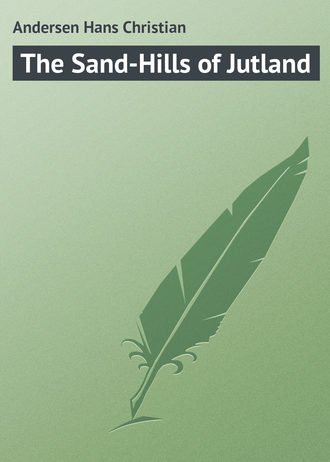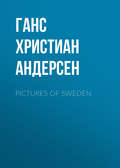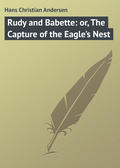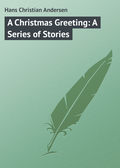
Ганс Христиан Андерсен
The Sand-Hills of Jutland
Soup made of a Sausage-stick
I
"We had a capital dinner yesterday," said an aged female mouse to one who had not been at the feast. "I sat only twenty-one from the old King of the Mice: that was not being badly placed. Shall I tell you what we had for dinner? It was all very well arranged. We had mouldy bread, the skin of bacon, tallow candles, and sausages. Twice we returned to the charge: it was as good as if we had had two dinners. There was nothing but good-humour and pleasant chit-chat, as in an agreeable family circle. Not a mite was left except the sausage-stick. The conversation happened to fall upon the possibility of making soup of a sausage-stick. All said they had heard of it, but no one had ever tasted that soup, or knew how to prepare it. A health was proposed to the inventor, who, it was remarked, deserved to be superintendent of the poor. Was not that witty? And the old King of the Mice arose and declared that the one among the young mice who could prepare the soup in question most palatably should be his queen, and he would grant them a year and a day for the trial."
"Well, that was not a bad idea," said the other mouse. "But how is the soup made?"
"Ay, how is it made? That was what they were all asking, the young and the old. Every one was willing enough to become the queen, but they were all loath to take the trouble of going out into the world to acquire the prescribed qualification; yet it was absolutely necessary to do so. But it does not suit every one to leave her family and her snug old mouse-hole. One cannot be going out every day after cheese parings, and sniffing the rind of bacon. No: such pursuits, too often indulged in, would perchance put them in the way of being eaten alive by a cat."
These apprehensions were quite terrible enough to scare most of the mice from going forth upon the search of knowledge. Only four presented themselves for the undertaking. They were young and active, but very poor. They would have gone to the four corners of the earth, if only good fortune might attend their enterprise. Each of them took with her a sausage-stick to remind her what she was travelling for. It was to be her walking staff.
On the 1st of May they set out, and on the 1st of May, a year after, they returned; but only three of them. The fourth did not report herself, and sent no tidings of herself; and yet it was the day fixed for the royal decision.
"There shall be no sadness or no drawback to our pleasure," said the King of the Mice, as he gave orders that every mouse within several miles round should be invited. They were to assemble in the kitchen. The three travelled mice were drawn up in a row alone. In the place of the fourth, who was absent, was deposited a sausage-stick covered with black crepe. No one ventured to utter a word until the three had made their statements, and the king had determined what more was to be said.
We have now to hear all this.
II.
WHAT THE FIRST LITTLE MOUSE HAD SEEN AND LEARNT ON HER JOURNEY
"When I first went forth into the wide world," said the little mouse, "I thought, as so many of my age do, that I had swallowed all the wisdom of the earth; but that was not the case – it required a year and a day for that to come to pass. I went at once to sea, on board a ship which was bound for the north. I had heard that cooks at sea were pretty well acquainted with their business; but there is little to do when one has plenty of sides of bacon, barrels of salt meat, and musty meal at hand. One lives delicately on these nice things; but one learns nothing like making soup of a sausage-stick. We sailed for many days and nights, and a stormy and wet time we had of it. When we reached our destination I left the vessel: this was far away up in the north.
"One has a strange feeling on leaving one's own mouse-hole at home, being carried away in a ship, which becomes a home for the time, and suddenly finding one's self, at the distance of more than a hundred miles, standing alone in a foreign land. I saw myself amidst a large tangled wood full of pine and birch trees. Their scent was so strong! It is not at all my taste; but the perfume from the wild plants was so spicy that I was quite charmed, and thought of the sausage and the seasoning for the soup. There were lakes amidst the forest, the water was beautifully clear close at hand, but looking in the distance as black as ink. There were white swans upon the lake. I mistook them at first for foam, they lay so still; but when I saw them fly I recognised them. They, however, belong to the race of geese. No one can deny his kindred. I like mine, and I hastened to seek the field mice, who, truth to tell, know very little except what concerns their food; and it was just that on account of which I had travelled to a foreign country. That any one should think of making soup out of a sausage-stick seemed to them so extraordinary an idea, that it was speedily circulated through the whole wood; but that the problem should be solved they considered an impossibility. Little did I think then that the very same night I should be initiated into the process.
"It was midsummer; therefore it was that the woods scented so strongly, they said; therefore were the plants so aromatic in their perfume, the lake so clear, and yet so dark with the white swans upon them. On the borders of the forest, amidst three or four houses, was erected a pole as high as a mainmast, and around it hung wreaths and ribbons. This was the Maypole. Girls and young men danced round it, and sang to the accompaniment of the fiddler's violin. All went on merrily till after the sun had set, and the moon had risen, but I took no part in the festivity; for what had a little mouse to do with a forest ball? I sat down amidst the soft moss, and held fast my sausage-stick. The moon shone brightly on a place where there was a solitary tree surrounded by moss so fine – yes, I venture to say as fine as the Mice-King's skin – but it had a green tint, and its colour was very soothing to the eye. All at once I saw approaching a set of the most beautiful little people, so little that they would only have reached to my knee; they looked like men and women, but they were better proportioned. They called themselves Elves, and their garments were composed of the leaves of flowers, trimmed with the wings of gnats and flies – not at all ugly. They seemed as if they were searching for something – what I did not know; but when they came a little nearer to me their leader tapped my sausage-stick, and said, 'This is what we want; it is all ready, all prepared;' and he became more and more joyful as he gazed upon my walking-stick.
"'You may borrow it, but not keep it,' said I.
"'Not keep it!' they all exclaimed together, as they seized my sausage-stick, and, dancing away to the green mossy spot, placed the sausage-stick there in the centre of it. They determined also on having a Maypole; and the stick they had just captured seeming quite suited to their purpose, it was soon ornamented.
"Small spiders spun gold threads around it – hung up waving veils and flags so finely worked, shining so snow-white under the moonbeams, that my eyes were quite dazzled. They took the colours from the wings of the butterflies, and sprinkled them on the white webs, till they seemed to be laden with flowers and diamonds. I did not know my own sausage-stick – it had become such a magnificent Maypole, that certainly had not its equal in the world. And now came tripping forwards the great mass of the elves, most of them very slightly clad; but what they did wear was of the finest materials. I looked on, of course, but in the background, for I was too big for them.
"Then what a game commenced! It was as if a thousand glass bells were ringing, the sound was so clear and full. I fancied the swans were singing, and I also thought I heard cuckoos and thrushes. At length it seemed as if the whole wood was filled with music. There were the sweet voices of children, the ringing of bells, and the songs of birds; and all these melodious sounds seemed to proceed from the elves' Maypole – an orchestra in itself – and that was my sausage-stick. I never would have believed that so much could have come from it; but much, of course, depended on what hands it fell into. I became very much agitated, and I wept, as a little mouse can weep, from sheer pleasure.
"The night was all too short; but, at this time of the year, the nights are not long up yonder. At the dawn of day there arose a fresh breeze; the surface of the lake became ruffled; all the delicately fine veils and flags disappeared in the air; the swinging kiosks of cobwebs, the suspension bridges and balustrades, or whatever they are called, which were constructed from leaf to leaf, vanished into nothing; six elves brought me my sausage-stick, and at the same time asked if I had any wish they could fulfil; whereupon I begged them to tell me how soup could be made from a sausage-stick.
"'What we can do,' said the foremost, laughing, 'you have just seen. You could scarcely have recognised your sausage-stick.'
"'You mean as you transformed it,' said I; and then I told them the cause of my journey, and what was expected at home from it. 'Of what use,' I asked, 'will it be to the King of the Mice and all our large community that I have seen this beautiful sight? I cannot shake the sausage-stick and say, You see here the stick – now comes the soup! That would be like a hoax.'
"Then the elf dipped its little finger into a blue violet, and said to me, —
"'Look! I spread a charm over your walking-stick, and when you return to the palace of the King of the Mice make it touch the king's warm breast, and violets will spring from every part of the staff, even in the coldest winter weather. See! you have now something worth taking home, and perhaps a little more.'"
But before the little mouse had finished repeating what the elf had said she laid her staff against the king's breast, and sure enough there sprang forth from it the loveliest flowers. They yielded so strong a perfume that the king commanded that the mice who stood nearest the chimney should stick their tails in the fire, in order that the smell of the singed hair should overpower the odour from the flowers, which was very offensive.
"But what was 'the little more' you spoke of?" asked the King of the Mice.
"Oh!" said the little mouse, "it is what is called an effect;" and so she turned her sausage-stick. And behold, there were no more flowers visible! She held only the naked stick, and she moved it like a stick for beating time.
"The violets are for sight, smell, and touch, the elf told me; but there are still wanting hearing and taste."
She beat time, and there was music – not such, however, as sounded in the wood at the elfin fête; no, such as is heard at times in the kitchen. It came suddenly, like the wind whistling down the chimney. The pots and the pans boiled over, and the shovel thundered against the large brass kettle. It stopped as suddenly as it had commenced; and then was only to be heard the smothered song of the tea-kettle, which was so strange with its tones rising and falling, and the little pot and the large pot boiling, the one not troubling itself about the other, as if neither could think. Then the little mouse moved her time-stick faster and faster; the pots bubbled up and boiled over; the wind roared in the chimney; the commotion was so great that the little mouse herself got frightened, and dropped the stick.
"It was hard work to make that soup," cried the old king; "but where is the result – the dish?"
"That is all," said the little mouse, courtesying.
"All! Then let us hear what the next has to tell," said the king.
III.
WHAT THE SECOND MOUSE HAD TO RELATE
"I was born in the palace library," said the second mouse. "I, and several members of my family there, have never had the good fortune to enter the dining-room, let alone the pantry. It was only when I first began my travels, and now again to-day, that I have even beheld a kitchen. We had often to endure hunger in the library, but we acquired much knowledge. The report of the reward offered by royalty for the discovery of the process by which soup could be made of a sausage-stick reached us even up there, and my grandmother thereupon looked for a manuscript which, though she could not read herself, she had heard read, wherein it was said, —
"'A poet can make soup out of a sausage-stick.'
"She asked me if I were a poet. I confessed I was not, to which she replied that I must go and try to become one. I begged to know what was to be done to acquire this art, for it appeared to me about as difficult to attain as to make the soup itself. But my grandmother had heard a good deal of reading, and she told me that the three things principally necessary were – good sense, imagination, and feeling. 'If thou canst go and furnish thyself with these, thou wilt be a poet; and there will be every chance of thy success in the matter of the sausage-stick.'
"So I set off to the westward, out into the wide world, to become a poet.
"Good sense I knew was the most important of all things, the two other qualities not being so highly esteemed. So I went first after good sense. Well, where did it dwell? 'Go to the ant; consider her ways, and be wise,' a great king of the Hebrews has said. I knew this from the library, and I never stopped until I reached a large ant-hill; and there I settled myself to watch them.
"They are a very respectable tribe, the ants, and full of good sense; everything among them is as correctly done as a well-calculated sum in arithmetic. 'To labour and to lay eggs,' say they, 'is to live in the present, and to provide for the future;' and that they assuredly do. They divide themselves into the clean ants and the dirty ones. Rank is distinguished by a number. The queen ant is number one, and her will is their only law. She has swallowed all the wisdom, and it was of consequence to me to listen to her; but she said so much and was so profoundly wise, that I could scarcely comprehend her.
"She said that their hill was the highest in the world; but close to the hill stood a tree that was higher, certainly much higher. She could not deny this, so she did not allude to it. One evening an ant had lost his way, and finding himself on the tree, he crept up the trunk, not as far as the top, but much higher than any ant had ever gone before; and when he descended, and found his way home at last, he imprudently told in the ant-hill of something much higher at a little distance from it. This was taken by one and all as an affront to the whole community, and the offending ant was condemned to have his mouth muzzled, as well as to perpetual solitude. But shortly after another ant got as far as the tree, and made a similar journey and a similar discovery. He spoke of it, however, discreetly and mysteriously, and as he happened to be an ant of consideration – one of the clean – they believed him; and when he died they placed an egg-shell over him as a monument in honour of his extensive knowledge.
"I observed," said the little mouse, "that the ants continually move with their eggs on their backs. One of them dropped hers. She tried very hard to get it up again, but could not succeed; then two others came and helped her with all their might, until they had nearly lost their own eggs, whereupon they let the attempt alone, for one is nearest to one's self; and the queen ant remarked that both heart and good sense had been shown. 'These two qualities place us ants among reasonable beings,' she said. 'Sense ought to be, and is, of the most consequence; and I have the most of that;' and she raised herself, in her self-satisfaction, on her hind leg. I could not mistake her, and I swallowed her. 'Go to the ant; consider her ways, and be wise.' I had now the queen.
"I then went nearer to the above-mentioned large tree: it was an oak. It had high branches, a majestic crown of leaves, and was very old. I perceived that a living creature resided in it – a female. She was called a Dryad. She had been born with the tree, and would die with it. I had heard of this in the library; and now I beheld one of the real trees, and a real oak-nymph. She uttered a frightful shriek when she saw me near her; for she was like all women, very much afraid of mice. She, however, had more reason to be afraid of me than others of her sex have, for I could have gnawed the tree in two, and on it hung her life. I spoke to her kindly and cordially. This gave her courage, and she took me in her slender hand; and when she understood what had brought me out into the wide world, she promised that I should, perhaps that very night, become possessed of one of the two treasures of which I was in search. She told me that Imagination was her very particular friend; that he was as charming as the God of Love; and that he often, for many an hour, sought repose under the spreading foliage of the tree, which then sighed more musically over the two. He called her his dryad, she said, and the tree his tree. The mighty, gnarled, majestic oak was just to his taste, with its broad roots sunk deep into the earth, its trunk and its coronal rising so high in the free air, meeting the drifting snow, the cutting winds, and the bright sunshine, before they had reached the ground. All this she said, and she continued: 'The birds sing up yonder, and tell of foreign lands, and upon the only decayed branch the stork has built a nest; and it is a pleasure to hear of the country where the pyramids stand. All this Fancy can well depict, and very much more. I myself can describe life in the woods from the time that I was quite little, and this tree was so tiny that a nettle could have covered it, until now, when it is so strong and mighty. Sit down yonder under the woodruffs, and be on the look-out. When Fancy comes I shall find an opportunity of pinching his wing, and stealing a little feather from it. You shall take that, and no poet will ever have been better provided. Will that do?'
"And Imagination came; a feather was plucked from him, and I got it," said the little mouse. "I held it in the water till it became soft. It was still hard of digestion, but I managed to gnaw it all up. It is not at all easy to stuff one's self so as to be a poet – there is so much to be put in one. I had now got two of the ingredients – good sense and imagination; and I knew by their help that the third ingredient was to be found in the library; for a great man has said and written that there are romances which are useful in easing people of a superfluity of tears, and which also act as a sort of swamp to cast feelings into. I remembered some of these books; they had always looked very enticing to me. They were so thumbed, so greasy, they must have been very popular.
"I returned home to the library, ate almost as much as a whole romance – that is to say, the soft part of it, the pith – but the crust, the binding, I let alone. When I had digested this, and another to boot, I perceived how my inside was stirred up; so I ate part of a third, and then I considered myself a poet, and every one about me said I was. I had headaches, of course, and all sorts of aches. I thought over what story I could work up about a sausage-stick, and there was no end of sticks and pegs crowding my mind. The queen ant had had an uncommon intellect. I remembered the man who took a white peg into his mouth, and both he and it became invisible. All my thoughts ran upon sticks. A poet can write even upon these; and I am a poet I trust, for I have fagged hard to be one. I shall be able every day in the week to amuse you with the story of a stick. This is my soup."
"Let us hear the third," said the King of the Mice.
"Pip, pip!" said a little mouse at the kitchen door. It was the fourth of them, the one they thought dead. She tripped in, and jumped upon the upper end of the sausage-stick with the black crape. She had been journeying day and night, travelling on the railroad by the goods train, in which she took great pleasure, and yet she had almost arrived too late; but she hurried forward, puffing and panting, and looking very much jaded. She had lost her sausage-stick, but not her voice; for she began talking with the utmost velocity, as if every one was dying to hear her, and no one could say anything to the purpose but herself. How she did chatter! But she had arrived so unexpectedly that no one had time to find fault with her or her talking, so she went on. Now let us listen.





